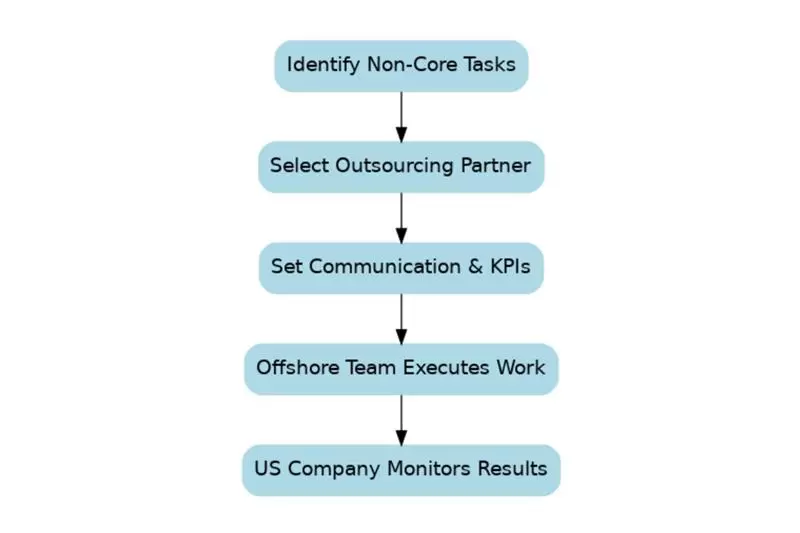In today’s competitive world, Global outsourcing services have become a game-changer for US companies. From startups to Fortune 500 firms, businesses are leveraging international expertise to cut costs, access skilled talent, and simplify operations. But outsourcing is not just about saving money, it’s about boosting overall efficiency and enabling businesses to focus on what matters most.
Let’s dive into how US companies are using outsourcing as a powerful growth strategy.

What is Global Outsourcing and How Does It Work for US Companies?
Global outsourcing is the practice where US companies delegate specific business functions to specialized service providers located overseas. Instead of managing every operation in-house, businesses leverage offshore partners to reduce costs, improve efficiency, and access skilled professionals. For instance, many firms adopt offshoring accounting services to streamline bookkeeping, tax preparation, and compliance tasks, ensuring accuracy while saving valuable resources.
How It Works for US Companies
The outsourcing process generally follows a structured flow:
- Identify Non-Core Tasks – Businesses determine which activities can be effectively outsourced.
- Select the Right Partner – They choose a reliable global provider with industry expertise.
- Set Communication & KPIs – Performance metrics and reporting guidelines are clearly defined.
- Execution by Offshore Team – The outsourcing partner manages day-to-day operations.
- Monitor and Review – US companies oversee progress to ensure goals and compliance are achieved.

Why It Matters
Global outsourcing is not just a cost-saving measure, it is a long-term strategy for growth. By shifting non-core responsibilities to offshore experts, US companies free up internal teams to focus on innovation, customer experience, and market expansion.
Why US Companies Rely on Outsourcing for Cost Efficiency
For US companies, outsourcing is one of the most effective ways to cut costs without compromising efficiency. Building and managing in-house teams comes with heavy expenses, salaries, benefits, office infrastructure, training, and compliance. Outsourcing reduces these overheads by shifting tasks to offshore teams, who deliver high-quality work at a fraction of the cost.
Here’s why outsourcing is a major driver of cost efficiency for US businesses:
- Lower Labor Costs – Offshore professionals can perform the same roles at 40–60% less than US employees.
- No Infrastructure Expenses – Companies don’t need to spend on office rent, equipment, or utilities.
- Reduced Recruitment and Training – Outsourcing partners manage hiring and upskilling, saving HR costs.
- Shared Technology Investments – Software, tools, and systems are provided by the outsourcing firm, cutting license fees.
- Flexible Pricing Models – Companies can choose hourly, project-based, or dedicated team structures to fit budgets.
- Scalable Spending – Businesses can increase or decrease outsourcing costs based on demand, ensuring financial control.
On average, outsourcing can save up to 40% of operational expenses, giving companies more room to reinvest in growth, innovation, and customer experience.
Why This Matters for Efficiency
Cost savings are not just about reducing expenses they help businesses redirect resources into areas that drive long-term growth and competitiveness. This makes outsourcing a strategic investment, not just a budgeting choice.
How Outsourcing Helps US Companies Focus on Core Business Goals
When businesses try to do everything in-house, they risk diluting their focus. Outsourcing lets US firms redirect time and resources to innovation, customer engagement, and scaling.
- Key Ways Outsourcing Supports Focus:
- Delegates repetitive back-office work.
- Allows leadership to concentrate on strategy.
- Enhances productivity across departments.
- Delegates repetitive back-office work.
In-House vs Outsourced Focus
| Activity | In-House Approach | Outsourced Approach |
| Bookkeeping | Time-consuming for staff | Done by offshore experts |
| Customer Support | 24/7 shifts add costs | Global teams ensure coverage |
| Marketing Analytics | Requires in-house training | Specialists provide insights |
Example: Many firms use outsourcing for small businesses to handle administrative and accounting tasks, letting owners focus on market growth and customer acquisition.
Why Outsourcing Improves Business Scalability and Flexibility
In today’s fast-changing market, scalability and flexibility are vital for US companies. Outsourcing allows them to adjust resources quickly without high costs or delays. Businesses can ramp up during peak demand and scale down in slow periods—without the hassle of hiring, training, or layoffs.
How Outsourcing Helps Scalability & Flexibility
- On-Demand Workforce – Expand teams when needed, cut back when not.
- Flexible Contracts – Choose project-based or long-term support.
- Cost-Effective Scaling – Grow without office or infrastructure costs.
- Global Talent Access – Tap into skills instantly.
- Operational Continuity – Offshore teams keep workflows smooth.
Outsourcing gives US firms the freedom to scale smarter and stay efficient.
What Risks Come with Outsourcing and How Do US Firms Manage Them?
While outsourcing offers efficiency and growth opportunities, it also comes with certain risks that US companies must carefully manage. Issues like communication gaps, data security concerns, or quality challenges can arise if outsourcing isn’t handled strategically. However, with the right planning, these risks can be minimized, ensuring smooth global operations.
Key Risks and How Companies Manage Them
| Risk | Description | How US Firms Manage It |
| Data Security | Risk of sensitive financial or client data being exposed. | Use strict NDAs, encrypted systems, and trusted outsourcing partners. |
| Communication Gaps | Time zone differences or unclear instructions can cause delays. | Define clear KPIs, set regular updates, and use collaboration tools. |
| Quality Issues | Work may not meet required standards initially. | Conduct trial projects, set benchmarks, and monitor performance. |
| Hidden Costs | Unexpected expenses beyond agreed terms. | Create transparent contracts and review cost breakdowns upfront. |
| Dependency on Vendor | Over-reliance on one partner can disrupt operations. | Diversify vendors and maintain partial in-house control. |
Conclusion
Global outsourcing helps US companies cut costs, scale faster, and focus on growth while managing risks through smart strategies. For financial operations, trusted accounting firm services provide accuracy and efficiency, making outsourcing not just a cost-saving move but a path to smarter, more agile business growth.
FAQs
Q1. What does global outsourcing do?
Global outsourcing allows companies to delegate specific business tasks or functions to specialized service providers in other countries. It helps reduce costs, access skilled talent, and improve overall efficiency while letting businesses focus on their core operations.
Q2. Is global outsourcing good or bad?
Global outsourcing can be highly beneficial when managed properly. It helps companies save costs, access specialized talent, and improve efficiency, though careful planning is needed to manage risks like communication gaps and data security.
Q3. What is global outsourcing sometimes called?
Global outsourcing is sometimes called offshoring or international outsourcing, as it involves delegating business tasks or services to companies or teams located in other countries.
